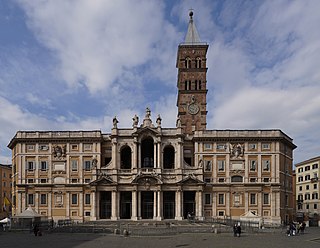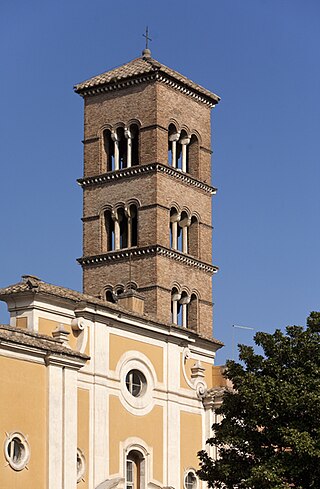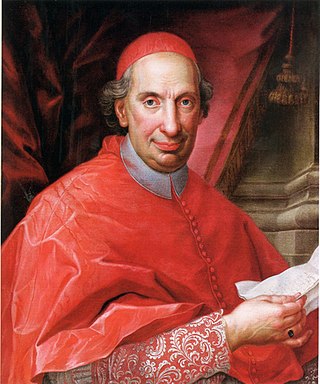
Pope Benedict XIII, born Pietro Francesco Orsini and later called Vincenzo Maria Orsini, was head of the Catholic Church and ruler of the Papal States from 29 May 1724 to his death in February 1730.

Pope Clement IX, born Giulio Rospigliosi, was head of the Catholic Church and ruler of the Papal States from 20 June 1667 to his death in December 1669.

Pope Clement X, born Emilio Bonaventura Altieri, was head of the Catholic Church and ruler of the Papal States from 29 April 1670 to his death, in July 1676. Elected pope at age 79, he has since been ranked as the oldest pope at the time of his election.

The Quirinal Hill is one of the Seven Hills of Rome, at the north-east of the city center. It is the location of the official residence of the Italian head of state, who resides in the Quirinal Palace; by metonymy "the Quirinal" has come to stand for the Italian president. The Quirinal Palace has an extension of 1.2 million square feet.

Guido Bentivoglio d'Aragona was an Italian cardinal, statesman and historian.

The Basilica of Saint Mary Major, or church of Santa Maria Maggiore, is a Major papal basilica as well as one of the Seven Pilgrim Churches of Rome and the largest Catholic Marian church in Rome, Italy.

Carlo Maratta or Maratti was an Italian painter, active mostly in Rome, and known principally for his classicizing paintings executed in a Late Baroque Classical manner. Although he is part of the classical tradition stemming from Raphael, he was not exempt from the influence of Baroque painting and particularly in his use of colour. His contemporary and friend, Giovanni Bellori, wrote an early biography on Maratta.

The Basilica of San Sisto Vecchio is one of the over sixty minor basilicas among the churches of Rome, and a titular church since 600 AD. As such, it is connected to the title of a Cardinal priest, currently Antoine Kambanda.

Decio Azzolino was an Italian Catholic Cardinal, code-breaker, investigator and leader of the Squadrone Volante.

Pietro Antonio Nelli was an Italian painter of the Rococo period. He created religious works, portraits, and landscapes.

The 1667 papal conclave was convened on the death of Pope Alexander VII and ended with the election of Cardinal Giulio Rospigliosi as Pope Clement IX. The conclave was dominated by factions loyal to the cardinal nephews of Alexander VII and Urban VIII. It saw the continued existence of the Squadrone Volante, or Flying Squadron, that had emerged in the 1655 conclave. The conclave also saw Spain and France, the two largest Catholic powers at the time, both support Rospigliosi's election as pope. Ultimately, Rospigliosi's election was achieved when the French ambassador bribed Flavio Chigi, Alexander's nephew, to support Rospigliosi. Following the conclave all the parties believed they had elected the pope that they had wanted.

Fabrizio Spada was an Italian Cardinal of the Roman Catholic Church, and served as Secretary of State under Pope Innocent XII.

Urbano Barberini was an Italian nobleman of the House of Barberini, third hereditary Prince of Palestrina and last legitimate male heir of the Barberini line. His great-grand uncle was Pope Urban VIII.

Flavio Chigi was an Italian Catholic Cardinal and Duke of Ariccia. He was Cardinal-Nephew to Pope Alexander VII and became a powerful political force inside the Roman Catholic Church during the latter half of the 17th century.

Pope Clement X created 20 cardinals in six consistories.

Lorenzo Imperiali was an Italian Catholic cardinal.

The House of Rospigliosi is an ancient noble Italian family from Pistoia. Attested since the Middle Ages, it became wealthy through agriculture, trade and industry, reaching the apogee of its power and the high nobility status in Rome thanks to Giulio Rospigliosi, elected pope in 1667 with the name of Clement IX.
Alessandro Crescenzi, C.R.S. was a Roman Catholic cardinal who served as Camerlengo of the Sacred College of Cardinals (1685–1688), Archbishop of Recanati e Loreto (1676–1682), Titular Patriarch of Alexandria (1671–1676), Bishop of Bitonto (1652–1668), Bishop of Ortona a Mare e Campli (1644–1652), and Bishop of Termoli (1643–1644).

Giacomo or Jacopo Rospigliosi was an Italian Roman Catholic cardinal.

Antonio Banchieri was an Italian cardinal.



















